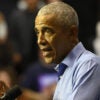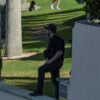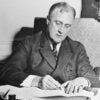Being on the FBI’s terrorist watch list doesn’t necessarily have a direct impact on an individual, experts say. This is why the Islamist-inspired gunman who murdered 49 people in Orlando was still able to purchase a firearm and work for one of the nation’s largest security firms.
The FBI twice investigated Omar Mateen, the Orlando mass murderer who pledged allegiance to the Islamic State, but authorities say he doesn’t appear to have been directed by the Sunni militant group. The FBI won’t confirm whether Mateen was on the list.
If he was on a list, it likely would have been the Terrorist Screening Database, which is for domestic and foreign individuals reasonably believed to be involved in terrorism. This is typically referred to as the terrorist watch list. Broadly, being on the list may have few consequences, but being on a subset of the list could have significant ramifications.
“The Terrorist Screening Center does not publicly confirm nor deny whether any individual may be included in the U.S. Government’s Terrorist Screening Database (TSDB) or a subset list,” spokesman Dave Joly said in an email to The Daily Signal. “Disclosure of an individual’s inclusion or non-inclusion [on the terrorist watch list] or on the No-Fly List would significantly impair the government’s ability to investigate and counteract terrorism, and protect transportation security.”
Mateen was previously on the terrorist watch list, but was later taken off the list, the Los Angeles Times reported. The newspaper reported that remaining on the list would not have stopped him from buying a gun.
Joly sent a later message explaining that “an individual’s presence”on the terrorist watch list is not “a disqualifying factor.”
An example of these subsets is “Known and Suspected Terrorist,” also known as the KST File.
Someone in this file would be flagged on the National Instant Criminal Background Check system when trying to purchase a firearm, said David Inserra, a policy analyst for homeland security and cyber policy for The Heritage Foundation. If a name were flagged, it would trigger an investigation, as anyone on the “known or suspected terrorist” file would be prohibited from buying a gun or explosives.
A widely known subset of the terrorist watch list is the “No-Fly List.”
“The criteria for the list is there has to be enough evidence for intelligence to raise a red flag,” Inserra told The Daily Signal. “An individual has to be nominated to the terrorist watch list. The No-Fly List has substantial criteria, above and beyond the [terrorist watch list].”
The specific criteria are confidential. According to the FBI, the “reasonable suspicion” standard must be based on credible information and intelligence by law enforcement, homeland security, and intelligence community agencies, as well as U.S. embassies and consulates, that an individual “knowingly engaged in conduct constituting, in preparation for, in aid of, or related to terrorism or terrorist activities.”
The National Counterterrorism Center reviews the information gathered.
The State Department, the Defense Department, the Transportation and Security Administration, the FBI’s National Crime Information Center, and the U.S. Customs and Border Protection are the five federal agencies that screen the terrorist watch list.
Mateen reportedly purchased a gun in the last two weeks. He also worked as a security officer at G4S Secure Solutions since 2007.
“It is a fairly high bar for restricting constitutional rights and rightly so,” said Jim Hanson, executive vice president of the Center for Security Policy, a national security think tank. “When you query a database, it’s more about connecting the dots than about stopping people.”
The watch list can seem ineffective, said Bill Roggio, senior fellow at the Foundation for Defense of Democracies, an organization that conducts research on terrorism, noting that the culprits in the Boston Marathon bombing were also reportedly on the list.
“We don’t know all of what has been averted, but in this case the list clearly failed,” Roggio told The Daily Signal. “These lists can only do so much without trampling on constitutional rights. But at some point, as this happens more, people are going to ask what good are these lists if we are not protected?”
This report has been modified to make consistent use of the term “terrorist watch list.”
































